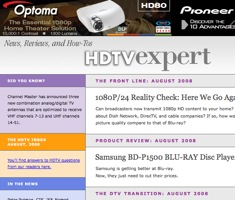
|

Pete Putman on HDTV
Pete Putman has been studying and writing about HDTV for more than 20 years. He is published in many major TV-focused magazines, including Pro AV and Home Theater. Putman currently manages HDTVexpert.com, an online HD resource featuring tutorials and up-to-date product reviews. He is President of ROAM Consulting, which offers testing, training and marketing to display manufacturers. He’s also Imaging Science Foundation-certified, qualifying him as an expert video technician. Putman offers encouragement for the HDTV neophyte.
What is the most immediately exciting thing about switching to HDTV?
It’s a package of stuff. Bigger, wider images with more picture detail and improved multi-channel sound. After you watch HDTV for a while, you won’t want to go back to analog, standard-definition TV (SDTV). Unfortunately for now, most programming on cable channels and non-network channels is still in SDTV.
What's the first thing someone should consider before making the switch?
How much HDTV do you plan to watch with the new set? It should be at least half of your viewing. Otherwise, why not just stay with a standard TV?
Are all digital televisions HDTV?
No. All TV sets 13 inches and larger are required by the FCC to include digital-TV tuners, but they aren’t necessarily HDTV sets. Nor is there any FCC requirement to transmit even a second of HDTV. Only one digital version of an existing analog channel is required for terrestrial [over-the-air] broadcasters after February 17, 2009. Stations and networks that are transmitting HDTV are doing so for marketing, sales or public relations reasons.
What does that mean for consumers?
It means that to comply with the FCC regulations and the 1996 law that enabled digital-TV broadcasting, all any broadcaster has to do is to transmit a digital version of what they are now sending out in analog. It doesn’t have to be HDTV, just standard-definition TV to be in compliance with the law [though many broadcasters do send over-the-air programming in HD, which can be picked up by a digital receiver/antenna].
But will we all have to go HD eventually?
No. Your old TV will work fine with an external Digital TV converter box, for as long as the TV lasts. It will show all digital-TV programs in standard-definition resolution. However, if you really want to watch HDTV programs, you will have to buy an HDTV set. Simple as that.
What should consumers pay the closest attention to when shopping for an HDTV?
Picture quality. It’s not the same with all of the new TV technologies. As a rule, there is a quality/price correlation. Lower-priced, second-tier and third-tier TV brands—Polaroid, Maxent, Olevia—won’t look as good as higher-priced, first-tier brands—Sharp, Panasonic, Samsung, Sony.
Again, when buying a new HDTV, it’s a smart idea to think about how much HDTV programming you’ll actually be watching. If most of your TV viewing is and will remain SDTV, go with a 720p [the lowest HD resolution] set. If you plan on watching several HD-cable or satellite channels and/or picking up a Blu-ray or HD DVD player, then a 1080p [the highest HD resolution] set makes sense.
How readily available is HD programming?
Most primetime, scripted, film-style, network shows are now in HD. A few reality shows are in HD, while others are still dragging their feet. Jeopardy and Wheel of Fortune have been in HD for about a year. Oprah goes HD this fall.
All major network sports are in HD now and dedicated HD cable/satellite channels include ESPN, ESPN2, Comcast SportsNet, NBA TV, NFL TV, YES, Versus, MTV HD, Discovery HD, History HD, Bravo, Starz, HBO, Showtime and Cinemax. Other HD channels are in the works for Turner Classic Movies, Style, The Learning Channel, Food Network. You name it; everyone wants to get in on the act.
ION networks will go HD in January. The CW also does HD, MyTV has done HD, but it’s not certain what future direction that network will take.
Blu-ray has won the HD disc war, so is there any reason to buy HD DVD now?
If you can still find them, they make excellent upscaling DVD players for regular DVDs and they're still cheaper than Blu-ray players now.
Since every studio is now in its court, will Blu-ray replace DVD as the main disc format soon? In other words, is it time to buy Blu-ray?
Nope, they're still too expensive in my view. In fact, I just read a story that there aren't enough players being shipped and average prices for Blu-ray players have gone up a little. There are some excellent upscaling DVD players out there, like OPPO's DV-980H and DV-983H. It depends on the screen size you use, but for 42-inch and smaller HDTVs, I don't see any big rush to get into Blu-ray right now.
What can early adopters do with their HD DVD players? Should they just toss them out?
Best Buy was running a program to give $50 gift cards for people who bought HD DVD players before a certain date. As I said earlier, they still make excellent upscaling DVD players and of course, there are plenty of movies out there in HD DVD format. You might be able to get some real discounts on them as they are closed out.
SIGNATURE QUESTIONS
What is the belief you personally go to during times of change?
The best is yet to come.
The best thing about change is...
…it’s constant.
What is the best change you have ever made?
Deciding to work for myself, and not anyone else, in 1980.
For more information on Pete Putman, visit www.hdtvexpert.com





